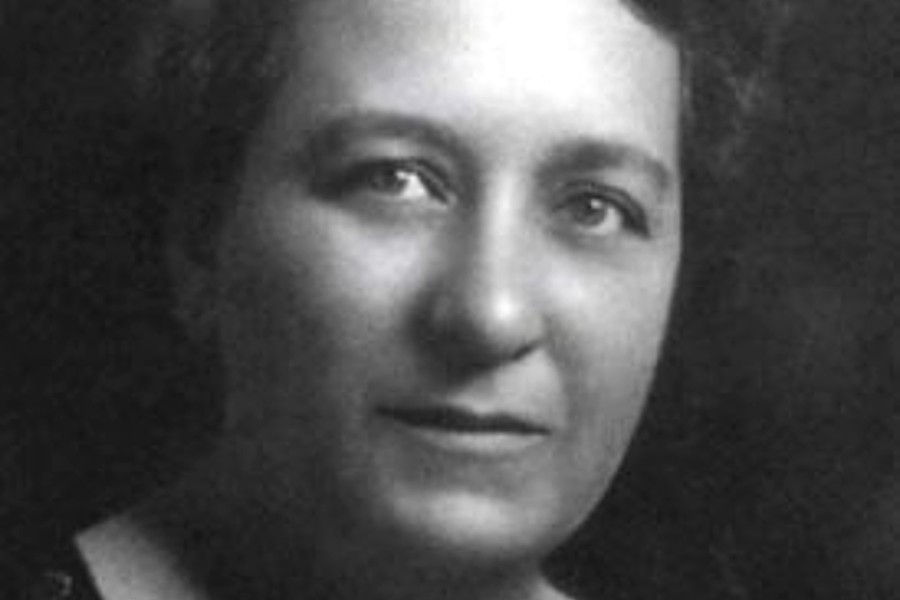 Belle Moskowitz, October 5, 1877 – January 2, 1933, was the political advisor to New York Governor and 1928 presidential candidate Al Smith.
Belle Moskowitz, October 5, 1877 – January 2, 1933, was the political advisor to New York Governor and 1928 presidential candidate Al Smith.
Belle Lindner was born in Harlem in New York City, to Isidor Lindner, a watchmaker; and Esther Freyer. Both parents were immigrants from East Prussia in Germany.
She attended the Horace Mann School, a laboratory school of Teachers College and in 1894 she attended Teachers College, Columbia University, but only stayed for one year.
In 1900 she became a social worker at the Educational Alliance. She held various appointments there, eventually becoming director of entertainments and exhibits.
In 1903 she married Charles Henry Israels (1864-1911), an artist and architect, whom she met at the Alliance where he had been a volunteer club leader.
They had four children, three of whom lived to adulthood: including Carlos Lindner, Miriam, and Joseph. In 1911, Charles died of pericarditis. As Belle Israels, Belle’s first effort at social reform was to clean up and license the city’s commercial dance halls, which she saw as places that got young working girls into trouble.
Working through the Council of Jewish Women-New York Section, by 1910 she had won laws that regulated dance hall conditions, including fire and safety and the selling of alcoholic drinks.
The New York Times stated, “These laws did more to improve the moral surroundings of young girls than any other single social reform of the period.”
She met her second husband, Henry Moskowitz, who had a Ph.D. in Philosophy and was a settlement worker on the Lower East Side, while working with him on dance hall reform. Their paths crossed many times during the tumultuous garment strikes of the era, and they worked together on the investigations that followed the Triangle Shirtwaist Factory fire.
They married in 1914. In 1913, her growing reputation led disputatious Garment District unions and employers to agree to her settling workers’ grievances in the dress and shirtwaist industry, a job she held until fall 1916. In 1918, she supported Al Smith for Governor of New York. Moskowitz became one of Smith’s most intimate advisers. Referring to her as “Mrs. M”, he kept her close at hand throughout his tenure as governor.
Tammany Hall sachems referred to her derisively as “Moskie,” coveting her influence. When Smith became the Democratic Party candidate for President in 1928, Moskowitz worked as his campaign manager. She worked as his press agent during his attempt for renomination in 1932.
On December 8, 1932 she fell down the front steps of her house at 147 West Ninety-fourth Street and, while recovering from the broken bones, died of an embolism on January 2, 1933 at age 55.
Prior to her role in Al Smith’s campaign, Moskowitz was a prominent female political innovator. She founded many political coalitions that strengthened notions of democracy in the U.S. before FDR’s New Deal was instated. Her career in social reform began as a young girl with the Temple Israel Sisterhood who collected money, organized sewing for the poor, and worked with United Hebrew Charities. The Sisterhood also organized a “Working Girl’s Vacation Fund” and a “Working Girl’s Club” to improve the qualities of life for women living in the city.
In January 1900, she began doing social work for the Educational Alliance, located in New York City’s Lower East Side. The Educational Alliance was an organization whose primary focus was cultural assimilation for Jewish immigrants.
She held a variety of positions at the Alliance, including the “Directress of Women’s Work” and directed exhibits and entertainment events, which increased in quality during her three and a half years there. The higher quality of entertainment performances decreased the benefactors’ patronization of Jewish immigrants.
At age 23, her first published article, “Social Work Among Young Women” focused on the importance of clubs in girls’ socialization as well as the importance women have in shaping communities. She concluded that when women are influenced by “right ideals, social, moral, artistic, intellectual, the higher becomes their standard of living.”
After leaving the Alliance, Moskowitz (then Israel) wrote for the United Hebrew Charities and Charities, a social work journal, for which she later became an editorial assistant.
She also joined the New York section of the Council of Jewish Women, yet another organization that helped Jewish immigrants.
In her role as chair of the philanthropy committee, her focus was welfare work. She oversaw sick and poor children at a hospital on Randall’s Island and visited troubled girls in reformatories.
This work eventually led to her first major project: The Lakeview Home for Girls, which opened for permanent use 1911. The Lakeview was located on Staten Island and gave young women temporary shelter, as well as aid in finding work.
Also with the Council, Moskowitz initiated a program for reform to make dancehalls a safer space for young women, particularly “working girls”, by controlling alcohol distribution.
In 2009, the National Jewish Democratic Council gave its first “Belle Moskowitz” award to Ann Lewis.
Photo credit: Belle Moskowitz. Courtesy of the Jacob Rader Marcus Center of the American Jewish Archives and World Wide Studio, NY.
Become a Harlem Insider!
By submitting this form, you are consenting to receive marketing emails from: . You can revoke your consent to receive emails at any time by using the SafeUnsubscribe® link, found at the bottom of every email. Emails are serviced by Constant Contact








